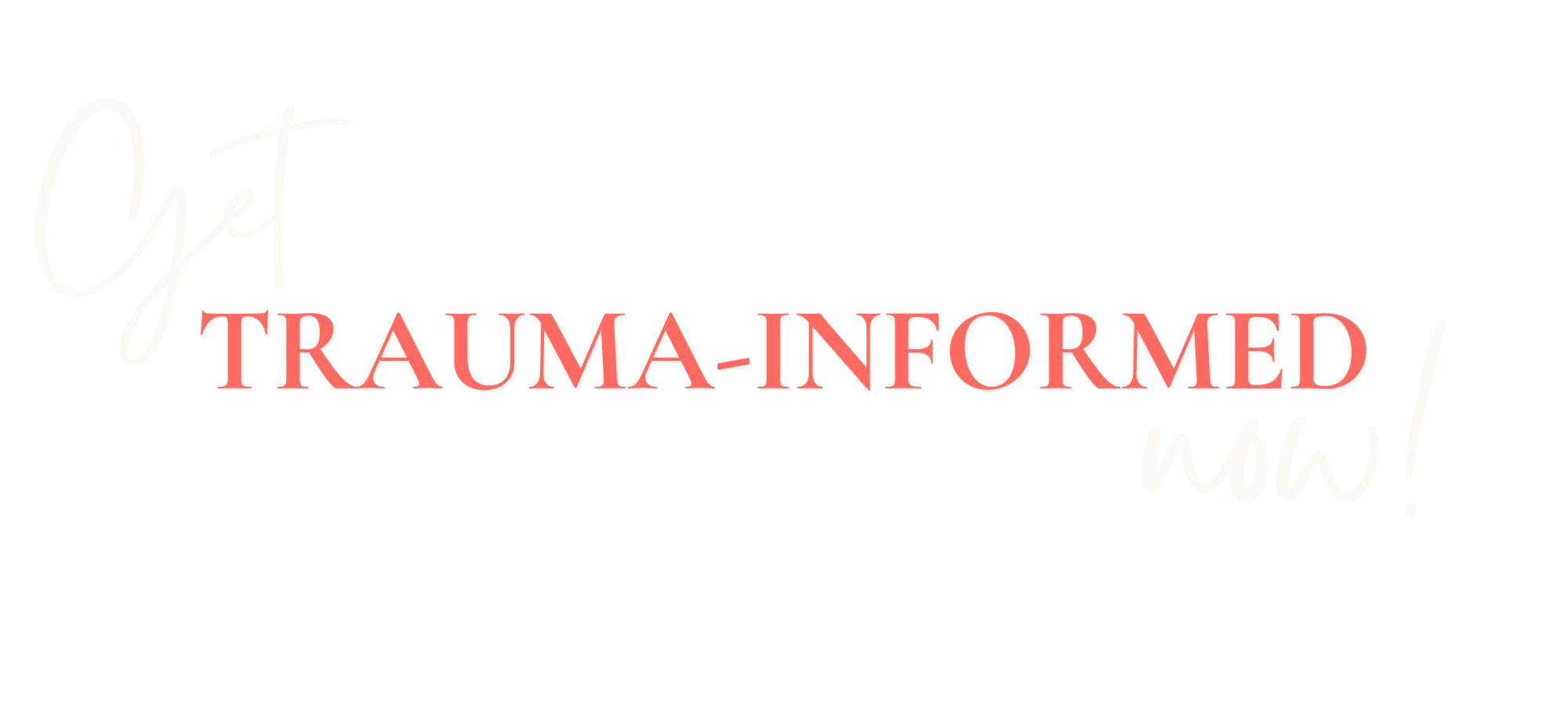B U N D L E
Trauma Work
Get Trauma-Informed Now Seminar
Safety, Consent & Boundaries in Trauma Work Seminar
Get access to two ESSENTIAL trauma-work TEACHINGS for therapists, coaches and healers for one low price.
Taken together, these two classes will give you a full understanding of all the elements of trauma and how they show up in your clients.
These elements include:
Understanding the role of those people who were told the traumatic story
The impact of trauma on our ability to make boundaries
How trauma locks people into a victimized identity and disconnect them from their power
The critical intelligence of dissociation, and the role of somatic experience in healing
In addition these two classes will address the single most important issue in working with trauma – the ethics involved in caring for a person and considering their capacity or lack of capacity to consent to the work you're doing with them. Without that ethical clarity, our work with trauma can override a persons needs and responses and re-injure.
“David Bedrick is a gentle warrior. His methodology is phenomenal. The most kind, soft, powerful vehicle I’ve ever encountered to heal trauma and release shame.”
What Past Students Are Saying…
“David makes a safe space for a deep deep healing and expression.”
“I had never heard someone talk about the impact of witnessing before!! It’s SO important and no one talks about it.”

Seminar One in the Trauma Work Bundle:
To be Trauma-Informed:
1. You must learn about the etiology of trauma.
Trauma is born of abuse that has been denied, gaslit, dismissed or neglected.
To be trauma-informed, you need to understand how people and systems that denied, dismissed, neglected or gaslit your client’s story and experience live in their psyche, bypassing and marginalizing their feelings and self-trust.
2. You must learn about what happens when trauma overwhelms the system.
When trauma overwhelms the system, we respond, naturally and organically, by dissociating.
To be trauma-informed, you need to become aware of dissociative states and how to honor the organic function of your client’s dissociation.
3. You must learn how trauma impacts our personal development.
Trauma freezes our psychological development, leaving parts of the Self caught in earlier feelings, projections, and unmet needs.
To be trauma-informed, you need to recognize how your client’s feelings and life patterns relate to their early stories.
4. You must learn how trauma disconnects people from their power and consent-making function.
To be trauma-informed, you must see how working with your client’s power and boundary-making capacity is actually a part of trauma healing.
5. You must learn about the use of somatic experience in healing trauma.
Because trauma leaves suppressed feelings in its wake, we need methods to access those feelings. Those methods must NOT ONLY access interoceptive or proprioceptive body experience, but also somatic experience that can be expressed in the body’s movement and voice.
6. You must learn how trauma perpetuates itself in the psyche by showing up as abusive inner criticism and internalized oppression.
When inner criticism is unconscious and unwitnessed, it retraumatizes the person on a daily basis. Working with inner criticism is a significant part of trauma healing.
What Past Students Are Saying…
“David bears gifts that our world in suffering desperately needs. His way of staying curious and listening deeply to what's unfolding has shifted so much of the way I understand my own trauma and the collective trauma we are all being asked to face.”
“David's work is the most profound healing work I have experienced in my long lifetime! His insights and deeply present and caring approach are a revelation. I am changed, in the best of ways.”

Every practitioner has had the experience of a client saying “yes” on the outside while their body quietly says “no.”
The breath changes.. Their eyes become glazed. Hesitations interrupt their speech. They’re a little too happy with everything you do.
These moments are easy to miss, especially when we’re focused on applying a technique or guiding a process. But they’re also some of the most important signals we’ll ever get. They tell us whether safety is present—or slipping away.
Learning to recognize and respond to these subtle cues is what separates trauma-informed practice from well-meaning practice.
That’s the focus of this seminar.
How to recognize minimal cues and subtle communication
Why consent is not a one-time agreement but a living, ongoing practice
How working with clients’ subtle communication heals boundary violations
Common ways retraumatization happens, often unintentionally
Live demonstrations so you can see these principles in action
Seminar Two in the Trauma Work Bundle:
Safety, Consent, and Boundaries in Trauma Work
What Past Students Are Saying…
“The definitions of trauma and explanation of the dynamics and components is so helpful.”
“I appreciate David's deep focus on client-guided consent so much.”
“Wow, that was INCREDIBLE. So many aha’s—personally and for my work with clients.”
THE ESSENCE OF TRAUMA INFORMED ETHICS
Because trauma disconnects people from their capacity to consent, clients are less able to say “yes” or “no” or “slow down” with you. However, they will still communicate this information in the form of tones, pauses, and body language. I call these "minimal cues.” In other words, their fawning and inability to set boundaries can unwittingly and unconsciously create a relationship WITH YOU that is abusive and retraumatizing unless you build an awareness of these minimal cues.
NORMAL INVESTMENT: $150 RECEIVE BOTH FOR $100
What Past Students Are Saying…
“If the whole world had David as their “witness” the world would be healed. He has such deep presence and genuinely cares.”
“ Beautiful and touching class. It opened my eyes to such new, deep possibility to create a completely new kind of, more sensitive, open, more listening relationship with my clients.”
“David's attuned and spontaneous engagement with members of the audience who spoke up - wow.”
MEET YOUR FACILITATOR:
David Bedrick is the author of The Unshaming Way, about which Gabor Mate wrote, ”In this astute work, David Bedrick provides a deep investigation of shame, the most debilitating of our mind states, and offers a workable, practice-based, and accessible path to divesting ourselves from it.”
Davidis a teacher, counselor, and attorney. He was on the faculty for the University of Phoenix for 8 years as well as the Process Work Institute in the U.S. and Poland. He is the founder of the Santa Fe Institute for Shame-based Studies where he educates therapists, coaches and healers. His embodied way of teaching goes beyond informational, students are regularly brought to tears and face to face with their beauty, power, life path and soul.
David’s passion for studying shame arose from his childhood, growing up with a father who used fists and belts to express his rage and a mother who coped by denying and gaslighting his experience. Forty years of research, teaching, and working with individuals awakened his heart and mind to how the dominant healing paradigm pathologizes people—sees people's suffering and symptoms as something to “fix" instead of messages that deepen our relationships with ourselves and the world around us. David’s unshaming way treats difficulties as invitations to insight, soul, and the divine unfolding of our lives.
David also writes for Psychology Today and is the author of three additional books: Talking Back to Dr. Phil: Alternatives to Mainstream Psychology and Revisioning Activism: Bringing Depth, Dialogue, and Diversity to Individual and Social Change, You Can’t Judge a Body by Its Cover: 17 Women’s Stories of Hunger, Body Shame and Redemption. His 5th book will also be published by North Atlantic Books and available early in 2026.
© 2026 David Bedrick
LEARN
• Free Guide: The Anatomy of Shame
• UnShamed TV
• Blog
• Books
• Podcast
• Video, Audio & Other Media
• Psychology Today Articles
WORK WITH DAVID
•The Foundations of UnShaming Bundle
• UnShamed Monthly Medicine
• All Courses







